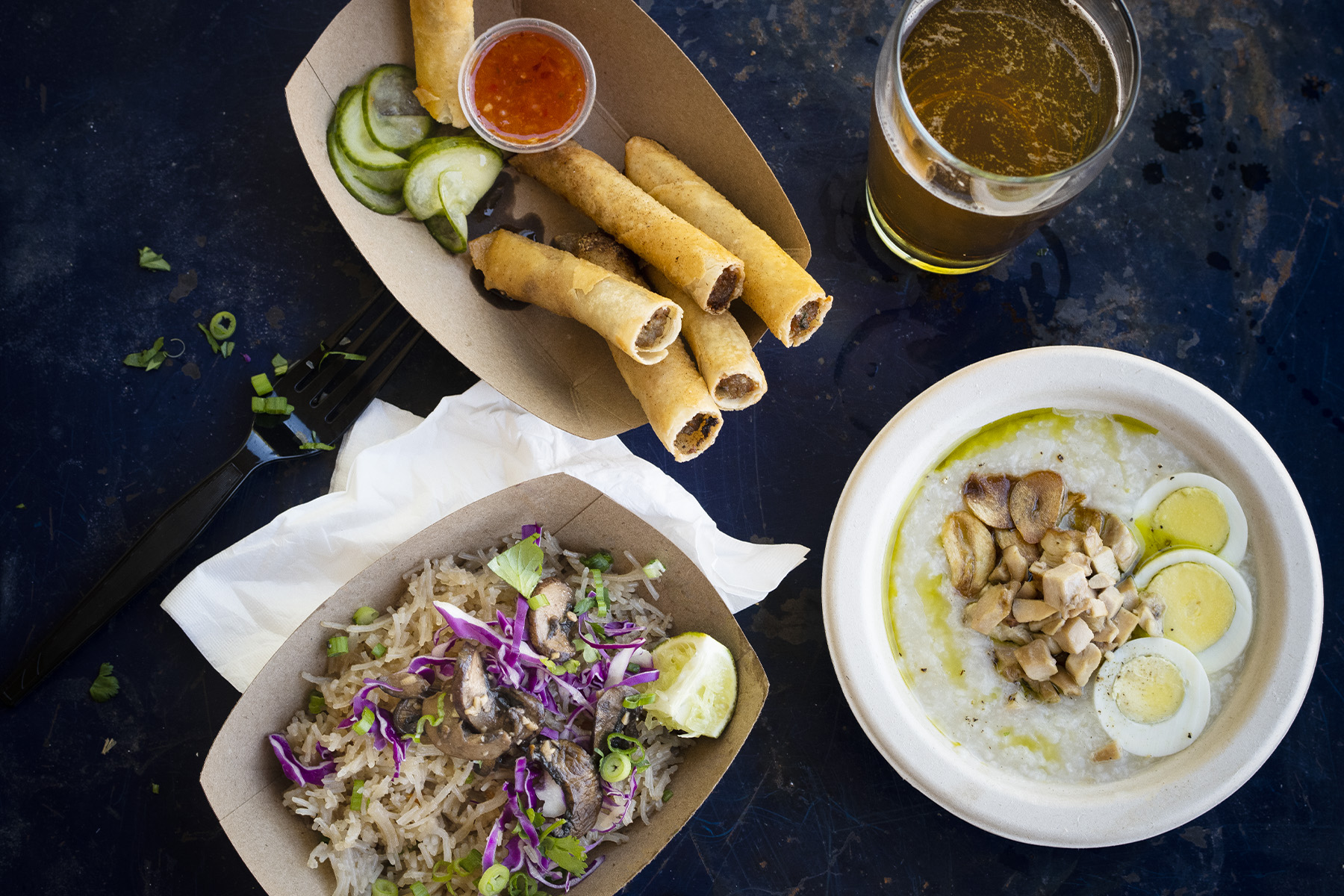It’s not often that news of a fast-food chain thrills me, but that a Jollibee location will open in Plano has me giddy. Any place with mango peach hand pie available via drive-thru has my automatic support. Although Jollibee isn’t my favorite Philippine-based chain—that would be the fast-casual Max’s Restaurant and the closest spot is in Houston—its arrival brings a few of my favorite Filipino dishes. One being halo-halo, meaning “mix-mix,” and as it sounds, it’s a shaved ice dessert that mixes various toppings like ube (purple yam) ice cream, condensed milk, sweet beans, jellylike coconut macapuno bits, fruit, flan, and more. It’s not unlike the icy treats of Vietnamese chè or Japanese kakigori.
As for Jollibee’s famous Chickenjoy™ fried chicken buckets, they’re as satisfying as you’d expect—but perhaps best enjoyed after a night of clubbing in Manila, I can attest. (Read more about Jollibee in yesterday’s News Bites.)
What Jollibee’s arrival really underscores is North Texas’ strong Filipino community. The fast-food chain, with locations in about a dozen states so far, chooses areas where Filipino people reside. According to U.S. Census data, Texas has the third-highest Filipino population behind only California and Hawaii. Outside of fast-food, it’s clear that a Filipino food movement in Dallas and surrounding cities is burgeoning.
D’s imitable dining critic Eve Hill-Agnus charted the Filipino pop-ups fueling the region earlier this year. It’s always worth a revisit, but it feels especially prescient now. In the current COVID era, so many of these pop-ups have not only adapted from hosting one-off events but innovated ways to serve their food according to how we eat today. In many ways, a lack of physical location helped connect with more diners.
Back in June, the women of Bilao and Hellalumpia, two pop-ups in the aforementioned feature, gathered around a table to hash out plans for their new collaboration: Bahay. When two pop-ups collide, only good things happen. Bahay means “house” or “home” in Tagalog, and it’s a nod to the place we’re all spending much more time in. And these sharp minds of Dallas’ Filipino food movement understand this. Bahay launched in time for the Fourth of July, selling grill kits with barbecue skewers, pork ribs, garlic fried rice, and more. Each weekend they post up at places like Lakewood Growler or Marie’s Kitchen in North Dallas (another Filipino outpost) where you can pickup preordered takeout. Pancit, lumpia, ube rice krispy treats—most recently they did a brunch menu (remember brunch?).
They’re leaving the concept of Bahay open so as to not cook themselves into a corner—they won’t only roll lumpia or construct Filipino barbecue pork and shrimp meal kits. Bahay is a house of many rooms. Each door unlocks a different dish, a different flavor, or a different experience. That’s the flexibility of a pop-up; you aren’t fixed in one place and you don’t have to be rigid in your food.
Denise Apigo of Bilao jokes about how her sister once told her, teasingly, “You should name your menu, ‘The Menu That Tita Disapproves of.'”
Not Your Lola’s, too, doesn’t get bogged down in tradition. The guys behind this pop-up create modern spins on Filipino food, be it okra lumpia—their play on the Texas barbecue side—or longanisa meatball roll. A week ago, after a hiatus, Not Your Lola’s was slinging Filipino barbecue at Trinity Cider in Deep Ellum. Watch their Instagram for another announcement for preorders.
Ulam, the pop-up that Anna Swann started in 2017, is a beloved go-to. She’s hosting a preorder-and-pickup pop-up at Khao Noodle Shop on August 28. Meanwhile newcomer The Pandesal Palace has burst onto the scene, selling out of their incredible baked goods each weekend (the dulce de leche ensaymadas are a must).
In March, right before the city shut down, I went to the first-ever Filipino Food Festival in Dallas at Four Corner’s Brewing, surely one of the last allowable mass gatherings. It was packed. Hours-long lines wending out the taproom and throughout the beer garden, populated by folks balancing El Chingón beer in one hand and mini plates of lumpia in the other. The vendors didn’t anticipate the sheer number of folks who would turn out for the inaugural fest. Many food booths were selling out long before the event’s end time to some disappointed fest-goers, but mostly people remained in good spirits. I think they were feeling seen, uplifted by the community showing up, inspired by how many desperately wanted to eat their food.
The ladies of Bahay hope its the first of many more Filipino Food Festivals. “We want future chefs out there to have a venue or have an avenue,” says Rachel Trammell, one half of Hellalumpia with Sarah Rañola. “We want to be the people that we were looking for when we started out.”
After all, a food movement halts for no one and nothing, including a pandemic. I’ll be dreaming of a time when we can tightly fill a brewery again, waiting for passed bites of food, laughing at how ridiculous we all are for spending a whole day doing this, talking about how each morsel is entirely worth it.
Until then, I hope you’ll be ordering a taste of what our Filipino food scene has to offer.
A version of this story was published in the SideDish newsletter. Sign up here so you don’t miss the latest food and drink news and stories.





